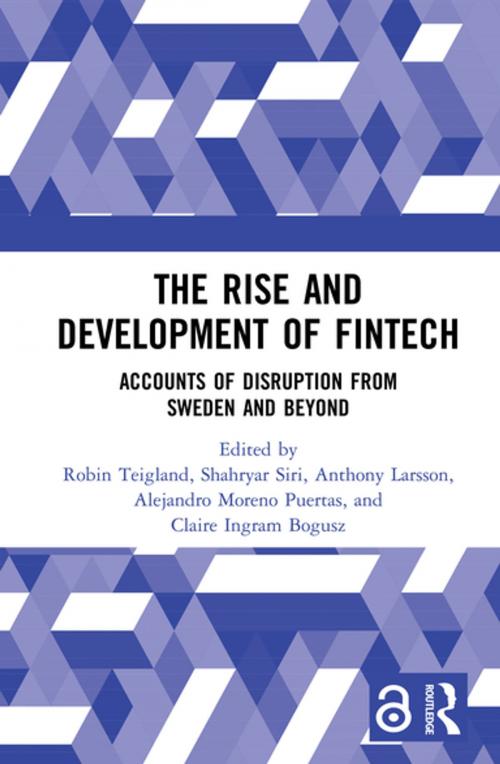The Rise and Development of FinTech (Open Access)
Accounts of Disruption from Sweden and Beyond
Business & Finance, Finance & Investing, Corporate Finance, Banks & Banking| Author: | ISBN: | 9781351183604 | |
| Publisher: | Taylor and Francis | Publication: | February 15, 2018 |
| Imprint: | Routledge | Language: | English |
| Author: | |
| ISBN: | 9781351183604 |
| Publisher: | Taylor and Francis |
| Publication: | February 15, 2018 |
| Imprint: | Routledge |
| Language: | English |
This comprehensive guide serves to illuminate the rise and development of FinTech in Sweden, with the Internet as the key underlying driver. The multiple case studies examine topics such as: the adoption of online banking in Sweden; the identification and classification of different FinTech categories; process innovation developments within the traditional banking industry; and the Venture Capital (VC) landscape in Sweden, as shown through interviews with VC representatives, mainly from Sweden but also from the US and Germany, as well as offering insight into the companies that are currently operating in the FinTech arena in Sweden. The authors address questions such as: How will the regulatory landscape shape the future of FinTech companies? What are the factors that will likely drive the adoption of FinTech services in the future? What is the future role of banks in the context of FinTech and digitalization? What are the policies and government initiatives that aim to support the FinTech ecosystem in Sweden? Complex concepts and ideas are rendered in an easily digestible yet thought-provoking way.
The book was initiated by the IIS (the Internet Foundation in Sweden), an independent organization promoting the positive development of the Internet in the country. It is also responsible for the Internet’s Swedish top-level domain .se, including the registration of domain names, and the administration and technical maintenance of the national domain name registry. The book illustrates how Sweden acts (or does not act) as a competitive player in the global FinTech arena, and is a vital addition to students and practitioners in the field.
This comprehensive guide serves to illuminate the rise and development of FinTech in Sweden, with the Internet as the key underlying driver. The multiple case studies examine topics such as: the adoption of online banking in Sweden; the identification and classification of different FinTech categories; process innovation developments within the traditional banking industry; and the Venture Capital (VC) landscape in Sweden, as shown through interviews with VC representatives, mainly from Sweden but also from the US and Germany, as well as offering insight into the companies that are currently operating in the FinTech arena in Sweden. The authors address questions such as: How will the regulatory landscape shape the future of FinTech companies? What are the factors that will likely drive the adoption of FinTech services in the future? What is the future role of banks in the context of FinTech and digitalization? What are the policies and government initiatives that aim to support the FinTech ecosystem in Sweden? Complex concepts and ideas are rendered in an easily digestible yet thought-provoking way.
The book was initiated by the IIS (the Internet Foundation in Sweden), an independent organization promoting the positive development of the Internet in the country. It is also responsible for the Internet’s Swedish top-level domain .se, including the registration of domain names, and the administration and technical maintenance of the national domain name registry. The book illustrates how Sweden acts (or does not act) as a competitive player in the global FinTech arena, and is a vital addition to students and practitioners in the field.















